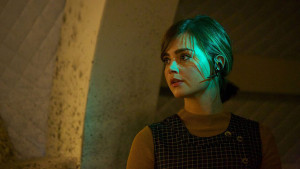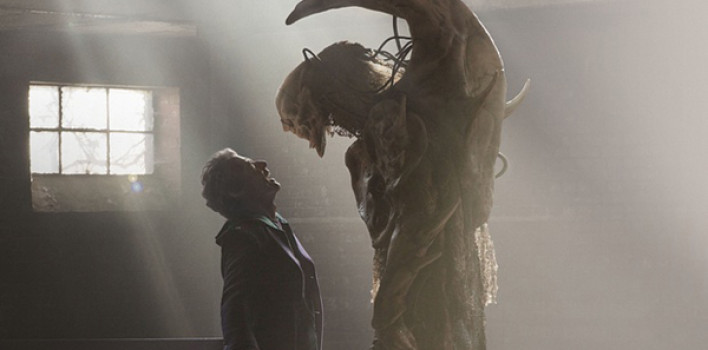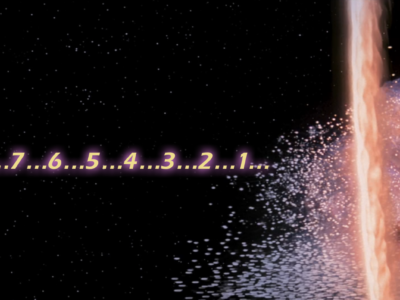Who·ology #016 – S09E04 Before the Flood
Welcome Whovians, to the new incarnation of Who·ology here on Reel World Theology. Unlike the return of Missy to this season of Doctor Who, we have reasons for the regeneration of this weekly feature from podcast to written review, but suffice to say, we still love Who and still plan to bring you our take on it each week to hopefully stir some discussion. So let’s get to it!
If this episode doesn’t get your head spinning with wibbly wobbly timey wimey-ness then you just may be a genius. Before The Flood deals head on with the Bootstrap Paradox, also known as the Casual Loop, which posits the theory that a past event can by created by a future event that was the direct result of the same past event it created. You might need to read that sentence again. Or, as the Doctor suggested, Google it. When you do, you will see that even Calvinists might have a hard time wrapping their heads around foreknowledge becoming self fulfilling prophecies. But enough Wikipedia diving, we have aliens to talk about!
 Yes, our rock and roll time lord introduces us to the concept of the Boostrap Paradox from the beginning of this part two. The Doctor breaking the fourth wall and talking directly to the audience still confuses me, but it does have a history in the show. Since it doesn’t get in the way of a great episode, I will give it a pass for now. And let me just reiterate, I thought that this was a really good Doctor Who episode. I was genuinely on my seat waiting to see how this one would resolve. It was clever, well paced, and spooky throughout. We had reasons to care about the supporting characters and we saw some very interesting potential foreshadowing of the season ahead (did you catch that bit about “the Minister of War?”) It was so slight I thought Russell Davies was back in charge of the show.
Yes, our rock and roll time lord introduces us to the concept of the Boostrap Paradox from the beginning of this part two. The Doctor breaking the fourth wall and talking directly to the audience still confuses me, but it does have a history in the show. Since it doesn’t get in the way of a great episode, I will give it a pass for now. And let me just reiterate, I thought that this was a really good Doctor Who episode. I was genuinely on my seat waiting to see how this one would resolve. It was clever, well paced, and spooky throughout. We had reasons to care about the supporting characters and we saw some very interesting potential foreshadowing of the season ahead (did you catch that bit about “the Minister of War?”) It was so slight I thought Russell Davies was back in charge of the show.
We again get to roll our eyes at the preposterous idea that the Doctor would actually die. It’s becoming comical that show writers continue to play with this idea like we would buy into it being possible. The Doctor won’t die. The show is too popular. But it does set up the previously mentioned paradox and allows us to talk about eternal significance again, so it basically redeems itself.
The Doctor: “Gotta go sometime.”
Clara: “Not with me. Die with whoever comes after me, but you do not leave me.”
Finally and at long last we are getting somewhere with Clara’s character. Since we know that Jenna Coleman is exiting the show at season’s end, there is some extra weight to the words “whoever comes after me.” It’s like Clara even knows that the end could be nigh, and I love that they are writing her as desperate to rebel against the inevitability.
Clara: “You’ve made yourself essential to me. You’ve given me something else to be.”
 What a confession. And I have to praise Jenna Coleman for her delivery of this moment. It was subtle, just the right amount of hopeless anger. This is what Clara has become, and rightly so, it is what every companion will become if they remain long enough with the Doctor. It’s interesting that she blames the Doctor for this- “You’ve made yourself essential to me.” In fact it’s quite the opposite. This is one of the essential lessons of the show- when you run around long enough pretending to be the Doctor, you not only fail to become him, you end up losing yourself along the way.
What a confession. And I have to praise Jenna Coleman for her delivery of this moment. It was subtle, just the right amount of hopeless anger. This is what Clara has become, and rightly so, it is what every companion will become if they remain long enough with the Doctor. It’s interesting that she blames the Doctor for this- “You’ve made yourself essential to me.” In fact it’s quite the opposite. This is one of the essential lessons of the show- when you run around long enough pretending to be the Doctor, you not only fail to become him, you end up losing yourself along the way.
Look at the other companions. Donna Noble lost everything she gained with the Doctor. Rose Tyler was forever severed from the Doctor and erased from existence (though lucky for her she still lives in a parallel universe). Martha Jones wisely recognized the high cost of time and space travel and bailed out before it could do her more harm. This simply must be what happens to Clara. She has to pay the price (though the jury is out on if she will or not.)
In this episode we see the thread of the underlying issue- “something else to be.” What do you think is going to happen if your entire reason for being is wrapped up in a person who’s first rule is that he lies? Despite the incredible things you could experience when traveling with the Doctor- the adventures you would go on, the “monsters, things blowing up” you would see- is the cost of losing yourself, your identity worth it?
“In him was life, and that life was the light of men. The light has shined in the darkness and the darkness has not overcome it.” – John 1: 4-5
This is where Christianity pulls a Martha Jones and hops off the universal belief train. We as Christians don’t place our eternal hope upon ourselves or other people; we place it upon Christ, whom we believe is one thing that will never fail. Conversely, most ideologies will say that you can place your eternal hope upon your good works, or even someone that goes around doing good by trying to save the universe. The Doctor is may be a good thing to follow for a while, but he is not an ultimate thing to become.
 The Doctor may have life in him to give. Other people and things in our lives may bring about a spark of life within us. But those lights ultimately will be overcome by darkness. Christ promises a light that cannot be overcome by darkness. We are starting to see this play out with Clara, and to a minor degree with see an example of it in this episode with O’Donnell. She followed the Doctor, ignored the warnings of danger ahead, and she lost her life. Notice how this tends to happen around the Doctor? We can only wonder what will happen to Clara.
The Doctor may have life in him to give. Other people and things in our lives may bring about a spark of life within us. But those lights ultimately will be overcome by darkness. Christ promises a light that cannot be overcome by darkness. We are starting to see this play out with Clara, and to a minor degree with see an example of it in this episode with O’Donnell. She followed the Doctor, ignored the warnings of danger ahead, and she lost her life. Notice how this tends to happen around the Doctor? We can only wonder what will happen to Clara.
The Doctor: “You can’t cheat time, I just tried. You can’t just go back and cut off tragedy at the root. Because you find yourself talking to someone you just saw dead on a slab. Because then you really do see ghosts.”
Finally, while we don’t quite get a definitive statement on what souls are from the episode, we do see some resolution to the themes we visited in part one. The Doctor continues to act against his belief that you live, you die and that’s it. He will bend history if he can to save Clara, but it’s interesting to note that while we tend to play fast and loose with the rules of the Doctor Who universe these days, one rule that remains firm is the inevitability of time running out. Each Doctor regenerates, each companion eventually goes (some obviously take longer than others.) And so science fiction yet again illustrates a powerful lesson- we are all passing through. Whether we live for thousands of years as the Doctor does or not, time runs out. Not even a time lord can control it. We can only place the weight of our soul on something and hope that it proves eternal.
Next time on Who-ology: He’s the Doctor, and he saves people. Or, well, he saves Clara and other people benefit by also getting saved. We visit one of my favorite historical periods- the age of the Vikings! And hey, Arya Stark is there for some reason. Maisie Williams is a popular enough actress that I’m betting her character is a recurring one. Here’s hoping it’s more original than being a younger version of River Song.
In the meantime, if you need an aliens mingling with Vikings fix, you really need to watch this movie:







